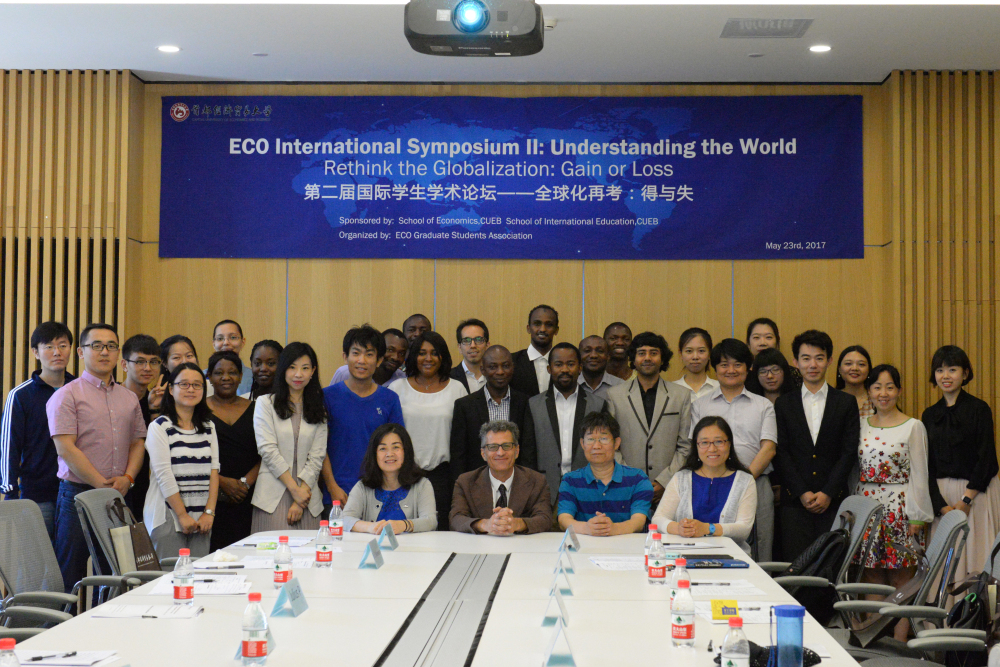School of Economics holds ECO International Symposium II: Understanding the World
On May 23rd, School of Economics, CUEB held in Boyuan Building ECO International Symposium II, the theme of which was Rethink the Globalization: Gain or Loss.
Lang Lihua, Dean of School of Economics, and Giovanni Trovato, professor of University of Rome Tor Vergata attended the symposium, along with Li Jing, Kang Zengkui, Hao Yubiao, Wang Yang, Shen Meng, Song Picheng, Yan Yunfeng, Jiang Xuemei and Lu Mingtao as speech advisors and Zhang Dongyang as the chairperson. Nine postgraduates and doctoral candidates from India, Kenya, Tanzania, Libya, Sierra Leone, Ecuador and China delivered speeches about globalization and other nine students commented on their speeches.

The speakers shared views on the influence globalization had exerted on employment, income distribution, climate change, environment, agriculture and culture. At the first stage of the symposium, Rahul Gupta from India held that globalization promoted the integration of world economy and culture and that free trade contributed to the growth of developing economies. As such, steady progress has been made in eliminating dire poverty. While analyzing the impact of globalization on agriculture in Sub-Saharan Africa, Yasin Kuso from Kenya, considered globalization as impetus to improve productivity, employment rate and new technology penetration and therefore it was conducive to poverty alleviation, economic inequality elimination and rural development. Waryoba Fulgence Dominick from Tanzania started with the environmental change in Mount Kilimanjaro and discussed how globalization influenced the environment. Using empirical research method, Xu Chenchen, from China, analyzed the effect of globalization on the structure of consumer goods in OECD countries. Research showed that the structure of consumer goods sources transferred from tradable goods to non-tradable goods. Developed countries were more likely to be affected by economic globalization and the increase of tradable goods facilitated consumption. Julius Pah Browne, from Liberia, came to the conclusion through empirical analysis that non-native enterprises could indirectly offer jobs to local people, i.e. the increase of FDI and GDP would increase employment rate.
At the second session of the forum, Kennedy Arthur Wainyaragania from Tanzania evaluated the challenges Tanzania were facing posed by economic globalization and proposed that methods like local investment protection, infrastructure development, internet and economic diversity were the way out. Bassiratu Ballay Mansaray from Sierra Leone presented the country’s cost and profit in globalization and held that its poverty would be eradicated in the surge of globalization. Yang Yi from China remarked on the influence of economic globalization on mandarin and predicted that globalization would not only affect the vocabulary and structure of the language but also make it more popular around the world. Andres Martinez from Ecuador used examples to show how culture shock affected export of education service in the process of globalization. Foreign students in China, from his perspective, all experienced culture shock which exerted negative influence on China's education markets. The influence, however, would be reduced as globalization advances.
In the comment and question session, advisors offered proposals concerning the theoretical basis and research methods. Exchanges enabled the participants to have a better understanding of the theme as well as globalization.
Started in 2016 by School of Economics, the “Understanding the World” series, mainly through international symposiums and academic roundtables, encouraged inclusiveness, innovation, mutual learning and in-depth discussion, and served as a favorable platform for students at home and abroad to understand the world better. Scholars from partner schools in the U.S., the UK, France and Italy, teachers from CUEB and students at home and abroad have seen these activities held in great success for six times. They discussed and learned from each other on hot economic topics, like global agricultural development, RMB internationalization, globalization etc., which improved students' international communication skills.
